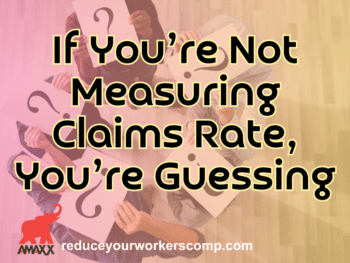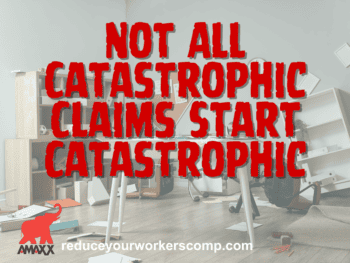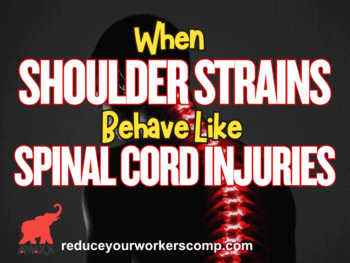Everyone has varying degrees of stress in their lives, both inside of the workplace and out. But the question employers have is when an employee comes to them and attempts to file a work comp claim stating that stress is their injury. So what do you do? Is this a compensable claim, or should it be funneled more towards a disability claim?
Click Link to Access Free PDF Download
“How Do I Get My Adjusters To Follow My Account Handling Instructions?”
Unless there is an extreme isolated event, stress will not be covered under the comp act (But you still should check with your legal counsel at all times). General job stress is always going to be present. Long work hours or a tight deadline to meet are considered normal within the workplace. Just because the stress is present doesn’t mean that it is automatically a covered work comp claim. [WCx]
The only scenario commonly accepted under work comp on a large-scale basis is a robbery, or some other very specific event that can lead to a diagnosis of post-traumatic stress disorder. Armed robberies, shootings, and other criminal acts that involve another employee can sometimes be covered under the work comp act, since that is deemed the specific catalyst in causing the stress condition. Harassment, personnel issues within a company involving employment, layoffs, firings, and so on usually will involve more of a human resources issue, and will generally fall under Employment Law rather than Work Comp. This will vary within the jurisdiction, but think about specifics of the actual activity, and how it caused a worker to be “injured”, either subjectively or objectively, within the course and scope of their employment.
We discuss some of the more popular factors of stress scenarios below:
-
What happened?
Depending on the jurisdiction, general workplace stress can be a tough claim to prove to be compensable under whatever work comp statutes are governing the claim. If a worker comes to the employer and says they have stress and need to file a comp claim, no matter what the scenario, the claim should be filed with your carrier. Remember, it is carrier’s job to determine what is work related and what is not, not yours. In fact, just the actions of not reporting a claim to your carrier can lead you into hot water with the governing work comp bureau. Despite the issues, and whatever the scenario may be, just file the claim, do your normal investigation, and gather as much information as possible and send it to the adjuster handling the file. Chances are that normal workplace stress will result in a denied claim under work comp, and the worker will be directed to their personal insurance for treatment and coverage.
-
Who was involved?
It is easy to say that a CEO of a large company has more actual job stressors than a person that works in the mail room sorting mail. But is there an isolated event that caused this stress? If so, who was involved? One example is altercations that turn physical between employees. An employee injured in a fight that did not actually “start” the altercation could qualify as a compensable claim. This situation will typically involve a lot of finger pointing as to who actually started the fight. This will typically be accepted as comp for the person injured until the facts areiron-clad in their existence and witnessed by others. If both parties cannot agree or there are other factors involved both inside of outside of the workplace then usually the carrier will not accept anything, and will let the employer be the responsible party as far as leading the investigation. The workers could then say that they have stress to even come to work now, since they feel they are being judged or gossiped about by the other employees, and again maybe this is compensable and maybe it is not. All you can do as the employer is report the claim, with as much information as you can, and pass it on to the adjuster handling the claim, and let them do whatever they see fit as far as compensability goes.
-
So what is the injury?
Stress claims come to carriers in a variety of ways, claiming a lot of different subjective and objective injury allegations. Mental stress, fear of other employees or retribution from management over a task that failed, anxiety problems involving coping with the situation, inability to focus on tasks, lost sleep due to the claimant “reliving” the incident, and so on and so on.
As the employer, look for the catalyst. What caused this situation to manifest? Was this a one-time acute issue that caused the situation, or was this something that was going on and on for months or years that finally boiled over and caused whatever situation to occur? How many different coworkers and levels of management were involved during this ongoing time? Was anything reported to management in the past, and if so what was done with discipline for the involved parties? The hard part of these claims will be talking to all of these other employees to get their sides of the story. To some, it may have been no big deal, and they could laugh at the allegation of stress arising from this incident. But to others, they could see it the exact opposite.
People all cope with stress differently, both inside of work and out, and a lot of times these stress claims can involve employees that have a lot of instability outside of the workplace that they can be bringing in with them as soon as the punch the clock to start their shift. This is what makes these claims so difficult. Claimants often will not elaborate to their adjuster during the investigation about the stressors of their personal lives outside of work, in order to make this work incident seem all that more isolated, and that is why they think it should be compensable, whether it actually is or not. [WCx]
Summary
As an employer you are going to come across one of these stress claims at one time or another. The most important thing to do is to not blow it off. Take the claim seriously, and report it to your carrier promptly. Gather as much information as you can, including names, dates, witnesses, and so on and have these coworkers give statements on what happened so the adjuster can have that as part of their file. Some may be more willing to talk than others, but it is your job to investigate it as you would with any other claim, despite whatever your personal assessment may be. In cases such as these, the adjuster can never have enough information, whether you think this claim is compensable or not.
Author Rebecca Shafer, JD, President of Amaxx Risk Solutions, Inc. is a national expert in the field of workers compensation. She is a writer, speaker, and publisher. Her expertise is working with employers to reduce workers compensation costs, and her clients include airlines, healthcare, printing/publishing, pharmaceuticals, retail, hospitality, and manufacturing. She is the author of the #1 selling book on cost containment, Workers Compensation Management Program: Reduce Costs 20% to 50%. Contact: RShafer@ReduceYourWorkersComp.com.
Editor Michael B. Stack, CPA, Director of Operations, Amaxx Risk Solutions, Inc. is an expert in employer communication systems and part of the Amaxx team helping companies reduce their workers compensation costs by 20% to 50%. He is a writer, speaker, and website publisher. www.reduceyourworkerscomp.com. Contact: mstack@reduceyourworkerscomp.com.
WORKERS COMP MANAGEMENT MANUAL: www.WCManual.com
Do not use this information without independent verification. All state laws vary. You should consult with your insurance broker or agent about workers comp issues.
©2012 Amaxx Risk Solutions, Inc. All rights reserved under International Copyright Law. If you would like permission to reprint this material, contact us at: Info@ReduceYourWorkersComp.



























